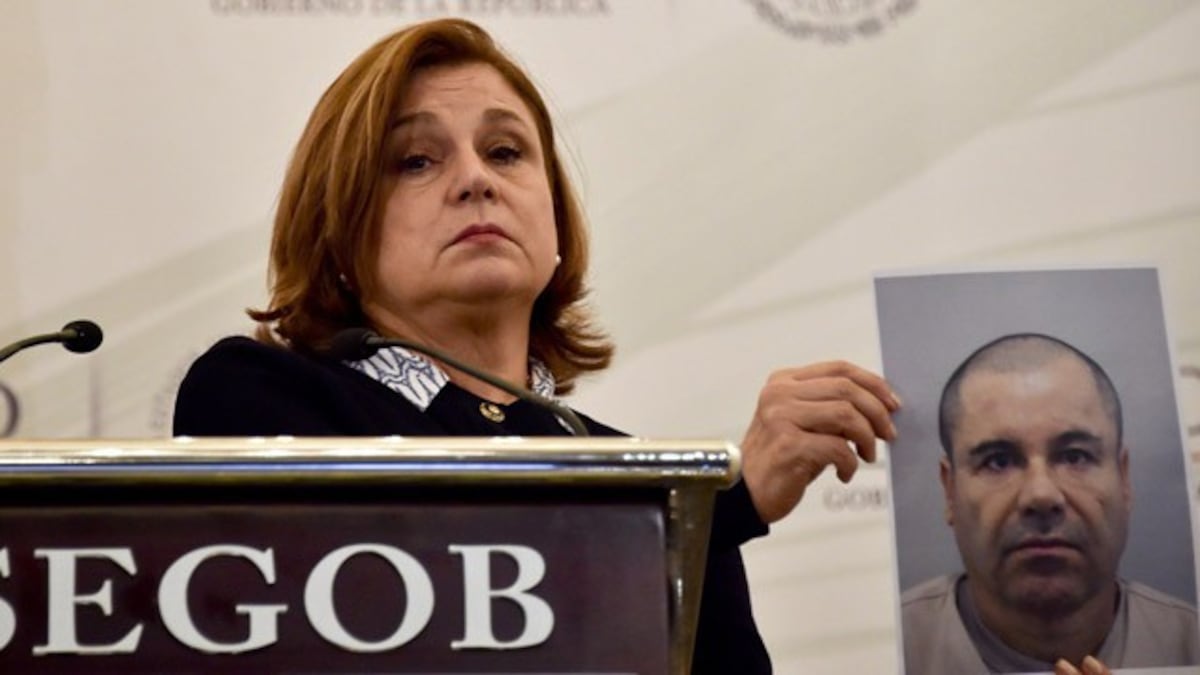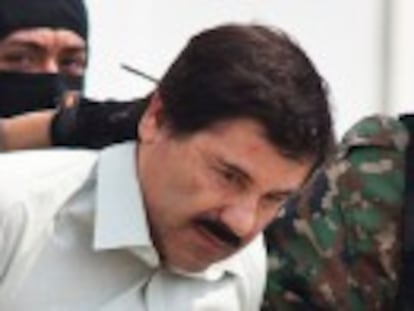“There will be no rest for El Chapo,” vows Mexican security chief
Massive manhunt ordered to find Sinaloa cartel head as fallout continues over jailbreak
The fallout from the daring escape of drug kingpin Joaquín El Chapo Guzmán from a maximum security prison continued on Tuesday, with opposition leaders demanding the resignation of Mexico’s top security chief.
Mexican military and police forces have fanned out across the country in search of the Sinaloa drug cartel leader, who on Saturday broke out of El Altiplano prison outside Mexico City through a 1,500-meter tunnel that had been dug beneath the complex.
Guzmán’s escape has dealt a severe blow to President Peña Nieto’s government
Guzmán entered the tunnel through an opening hidden beneath a shower, which led him to an empty house that had been under construction for months, far from the prison walls.
Guzman’s escape has dealt a severe blow to the government of President Enrique Peña Nieto, who just last year celebrated the capture of one of the world’s most wanted drug traffickers.
“This criminal is not going to sleep well at night,” said Miguel Ángel Osorio Chong, the president’s chief-of-staff and the nation’s security chief, who vowed to recapture him.
This was El Chapo's second escape. In 2001, he broke out from a prison in Jalisco state by hiding in a laundry cart.
Appearing before reporters on Monday, Osorio – who is in the midst of a political storm following the daring escape – announced the firings of all penitentiary supervisors, including the warden at El Altiplano prison, which is located in Almoloya de Juárez.
Osorio acknowledged that the government suspects officials may have aided Guzmán. A $3.75 million award is being offered for information leading to the capture of Mexico’s public enemy number one.
Guzmán’s breakout has not only revealed the breaches that exist in Mexico’s security institutions but also demonstrates how corruption runs rampant among government officials.
A $3.75 million award is being offered for information about Mexico’s public enemy number one
Addressing calls for his resignation made by the opposition conservative National Action Party (PAN) and other sectors, Osorio said that he would not step down.
“You don’t resign during moments of crisis – you confront the situation,” he said.
Following Guzmán’s capture by the Mexican navy in February 2014 at an apartment in the resort city of Matzlan, Peña Nieto publicly said that it would be Osorio’s responsibility to ensure that the cartel chief was heavily guarded.
The president, who is on an official visit to France, apparently continues to place trust in his close aide, and has put him in charge of the investigation.
“El Chapo” took off the electronic leg bracelet he wore to keep track of his movements just before he fled
Osorio said that El Chapo’s jail cell was monitored by video cameras, and the electronic leg bracelet he wore to keep track of his movements inside the penitentiary was removed moments before he fled.
“This entire escape has been strange because all security systems were broken, a tunnel was dug 19 meters deep, and the cameras monitoring him had two blind spots,” he said.
The chief of staff also denied a report that the US Drug Enforcement Administration (DEA) had alerted Mexican officials in March about two prior jail break attempts by Guzmán.
Guzmán is wanted by US authorities on federal drug-trafficking and money-laundering charges, but the Mexican government was unwilling to extradite him. He faces indictments in at least six federal court districts, including Chicago, where at least two tons of cocaine were allegedly sent every month by his cartel.
Extraditions have dropped from Felipe Calderón’s time in office when he declared a war against the cartels
The Sinaloa cartel is one of the biggest illegal drug organizations in the world, supplying cocaine, marijuana and other narcotics primarily to the United States and Europe.
Since Peña Nieto came to office in December 2012, the president and his Institutional Revolutionary Party (PRI) had moved away from the previous PAN administration’s hardline policy of quickly handing over wanted Mexican traffickers to the US.
The number of extraditions has dropped from Felipe Calderón’s time in office (2006-2012), when the PAN government declared war on the cartels. In the first two years of Peña Nieto’s government, 133 people were extradited to other countries but only 45 were sent to the United States to face drug charges. During Calderón’s last two years in office, 188 people were extradited.
In January, Jesús Murillo Karam, who was then attorney general in Mexico, said that he had first-hand knowledge through sources that Washington was preparing an extradition request for the Sinaloa cartel leader. His comments prompted Guzmán’s legal team to begin fighting the US extradition request, which never materialized.
The government wanted to keep Guzmán to show that Mexico can judge and imprison its own criminals
“Mexico is not obligated to send him over or ask that he be extradited because it violates a courtroom’s jurisdiction in a case,” explained law professor Gilberto Santa Rita of the Ibero-American University. The expert believes that the extraditions are not strictly legal maneuvers but are also political matters.
Before he resigned in February, Murillo said that he wanted Guzmán to complete his prison sentence in Mexico before sending him over to the United States in “about 300 to 400 years.”
The Peña Nieto administration had preferred to keep Guzmán in a Mexican prison as a symbol of pride and to demonstrate to the world that Mexico can judge and imprison its own criminals.
“They thought he was going to die in prison,” said Santa Rita. “If there had been some goodwill, one year is reasonable time for an extradition process.”
Tu suscripción se está usando en otro dispositivo
¿Quieres añadir otro usuario a tu suscripción?
Si continúas leyendo en este dispositivo, no se podrá leer en el otro.
FlechaTu suscripción se está usando en otro dispositivo y solo puedes acceder a EL PAÍS desde un dispositivo a la vez.
Si quieres compartir tu cuenta, cambia tu suscripción a la modalidad Premium, así podrás añadir otro usuario. Cada uno accederá con su propia cuenta de email, lo que os permitirá personalizar vuestra experiencia en EL PAÍS.
En el caso de no saber quién está usando tu cuenta, te recomendamos cambiar tu contraseña aquí.
Si decides continuar compartiendo tu cuenta, este mensaje se mostrará en tu dispositivo y en el de la otra persona que está usando tu cuenta de forma indefinida, afectando a tu experiencia de lectura. Puedes consultar aquí los términos y condiciones de la suscripción digital.










































